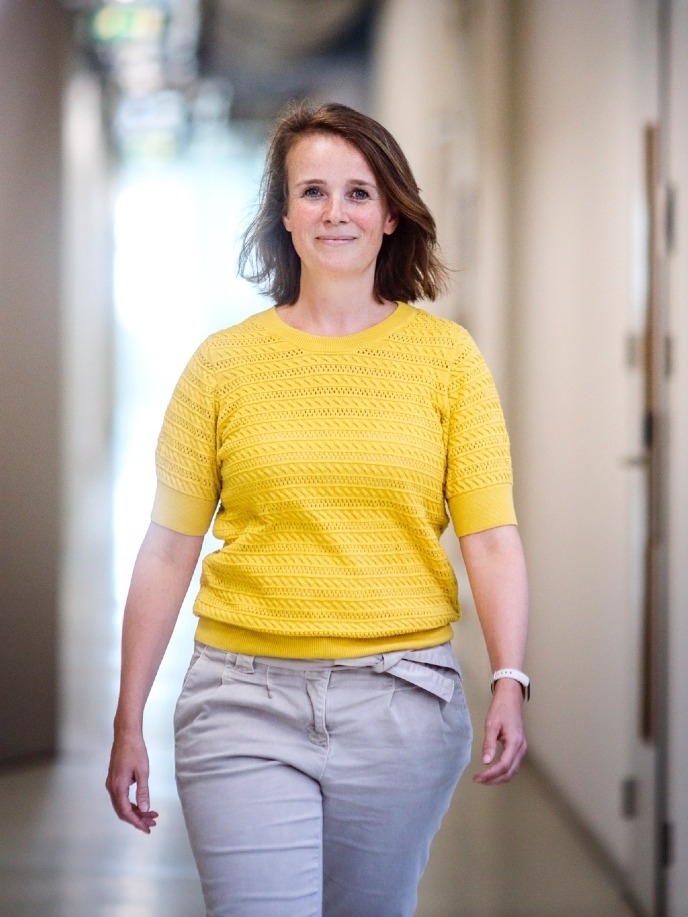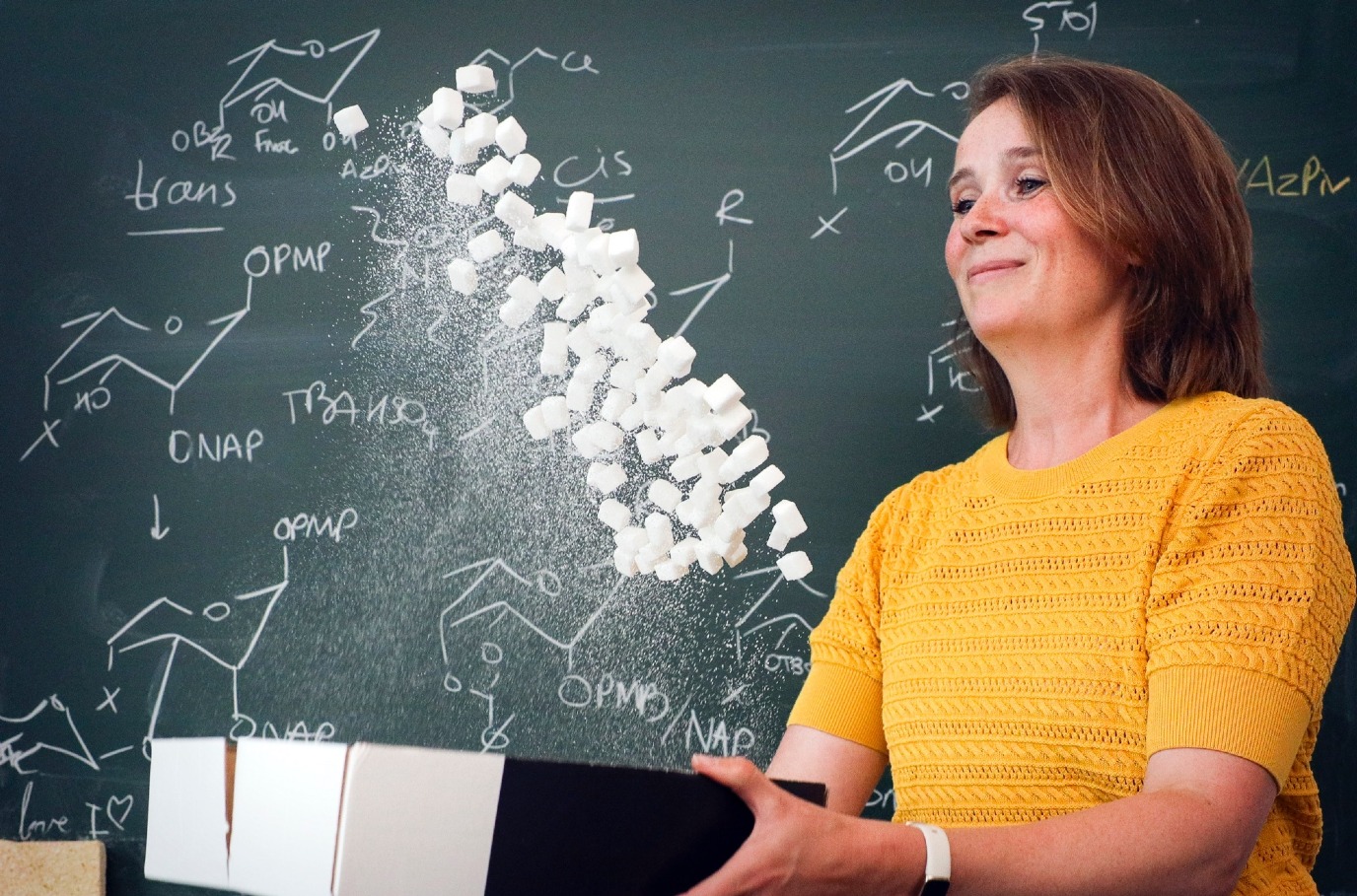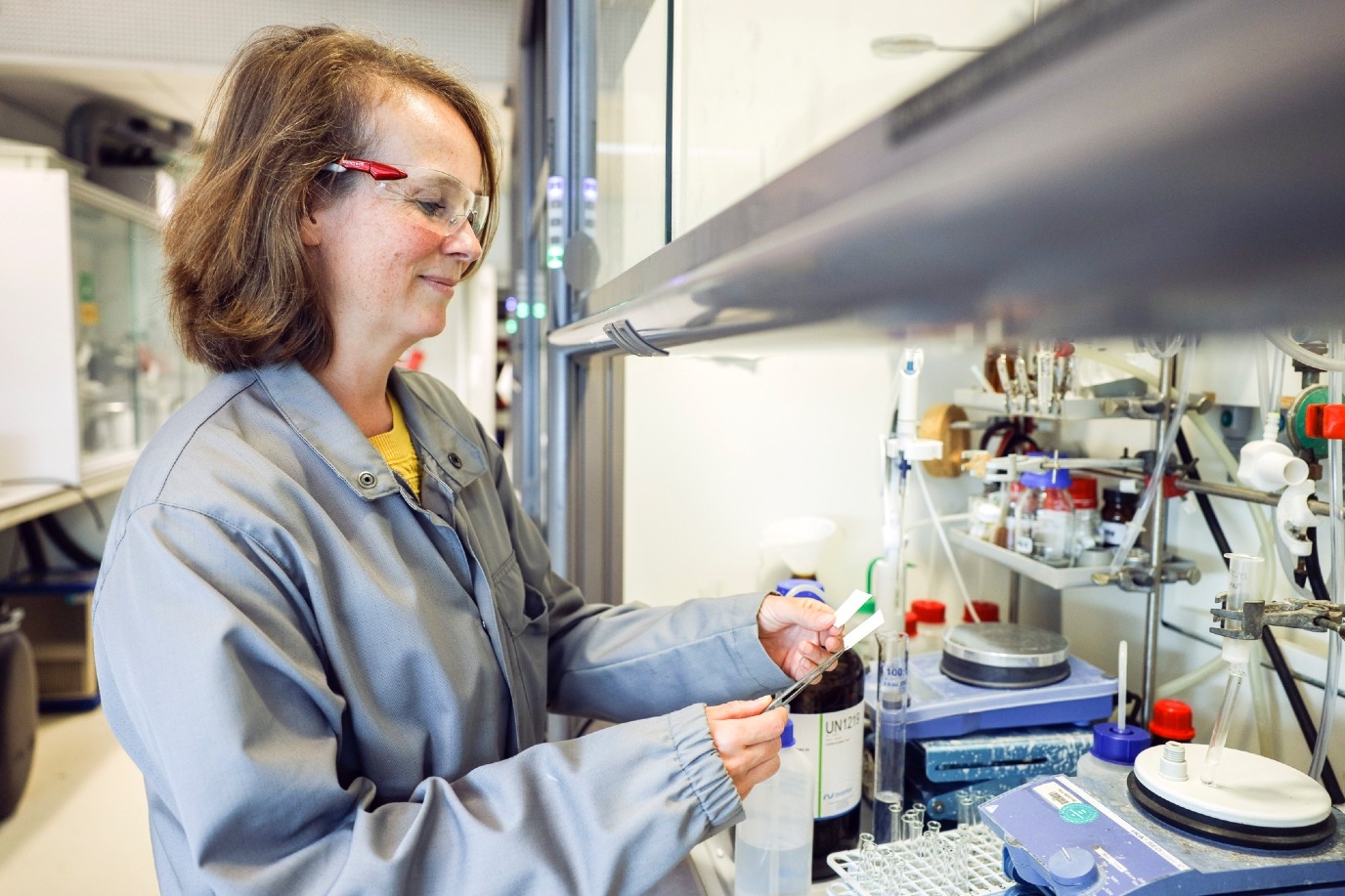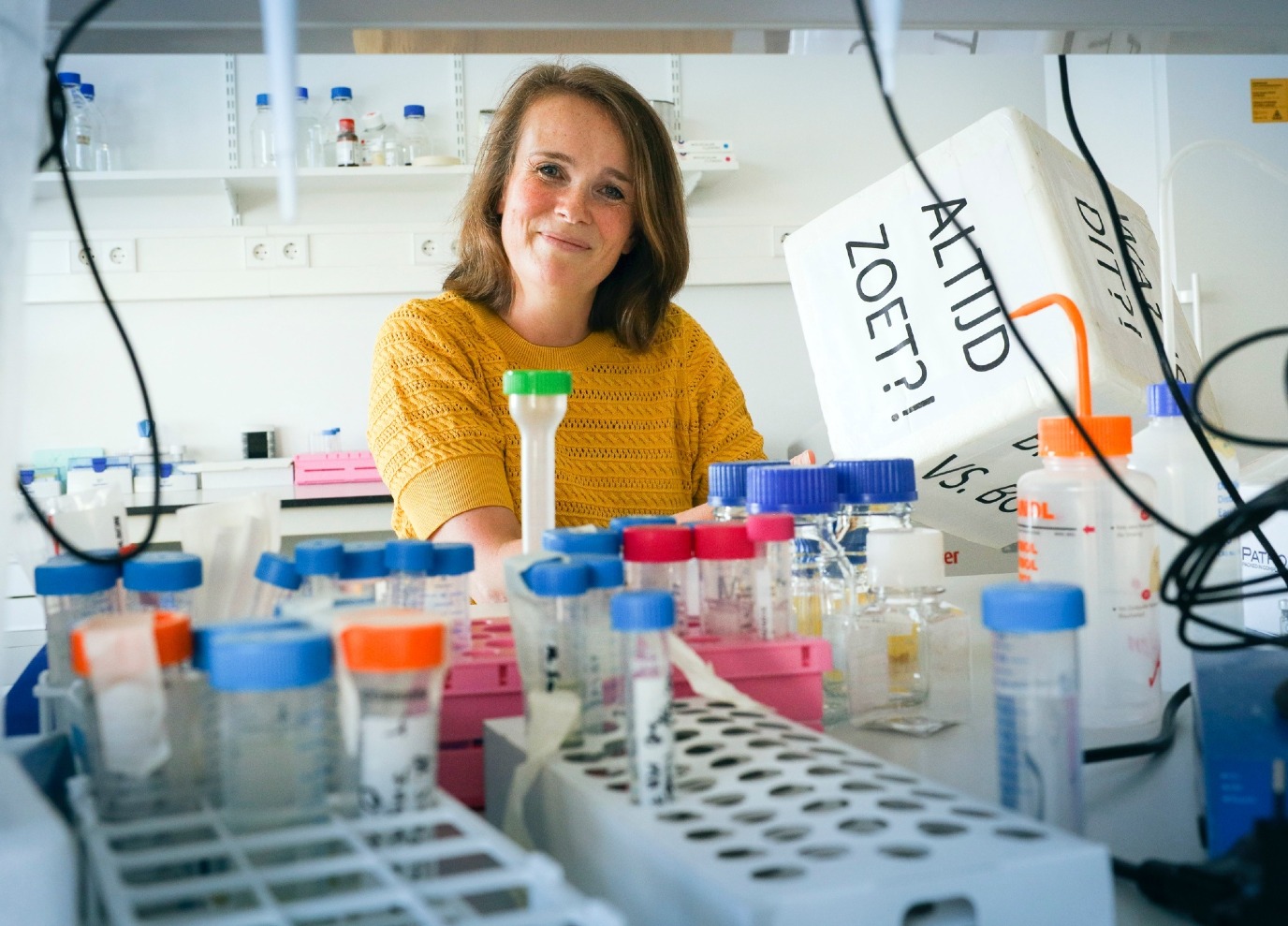Versatile sugars: more than sweetness

Marthe Walvoort, associate professor of Chemical Glycobiology, sees the transfer of knowledge about sugars as her mission. Sugars are both fattening and an essential source of energy. But they are so much more than that: sugars play a crucial role in biological functions, such as bacterial infections and the determination of your blood type.
Text: Jelle Posthuma / Photos: Henk Veenstra
Halfway through the interview, Walvoort places three bowls on the table, all containing whitish granulas. ‘Taste it,’ she encourages me. The flavours range from sweet and sour to virtually tasteless. The bowls contain various types of sugars: sucrose, lactose, and fructose. They all look and taste different, but chemically speaking, they are similar, the researcher says. The bowls are an excellent way of introducing the public to the range of sugars, and chemist Walvoort routinely brings them along to various outreach activities.
Myths
According to the researcher, there is still a lot unclear about sugar in society. Your body needs sugars as a source of energy, but too many sugars lead to obesity. ‘Some people say: sugars are bad, so I eat honey. But that is sugar just as well and no different in terms of calories. There are, however, differences in how the body breaks down the various sugars. That is why I think centrifugal juicers are a terrible invention. You lose all the fibres from the fruit and you’re left with sweet flavoured water.’
Due to all the unhealthy stimuli, eating healthy is tricky in our current society, Walvoort knows. ‘As a mother of four young children, I’m aware of that. There’s an obesity epidemic going on and there are a lot of myths about nutrition. That‘s why, for me, transferring knowledge about sugars has become some kind of mission, an opportunity to contribute directly. Doing fundamental research is incredibly fun and important, but it’s much more a matter of perseverance.’
There is a reason why Walvoort is the rector of the Pre-University Academy. This institute makes current academic research accessible to pupils of primary and secondary education. She also participates in De Kookshow [The Cooking Show], a programme by Universities of the Netherlands about the science behind cooking, and she joined a theatre tour about science. ‘You have to enjoy being in the spotlight a little. When I chose to study chemistry, my alternative was going to the dance academy. Ultimately, I chose the ‘thinking’ option, but I think it’s great that it all comes together again now, the fact that I can also display my love of performance.’

Sugar coats
She is by now seen as the ‘sugar expert’ in the media. I hear Walvoort start roaring with laughter. ‘I was recently on an episode of the children's tv programme Klokhuis. They announced me as: Marthe knows everything about sugars.’ She laughs loudly again. ‘When the public talks about sugars, they are often referring to granulated sugar. My research is actually about something else. I always distinguish between the sugars found in nutrition that we use for energy, and all other sugars, which are involved in biological effects and functions, such as bacterial infections. In my research, I focus on the latter category.
Walvoort looks in particular at the cell walls of bacteria. These cell walls are covered in a thick layer of sugars called the glycocalyx. ‘Call it a sugar coat, if you will. Every cell, whether in our bodies or in plants, has such a sugar coat. The same goes for bacteria. Bacteria need this layer to cause an infection: the bacteria attach to our cells using the sugar coat. We want to investigate what the cell walls of bacteria look like and which sugars they make.’
Knowledge about these sugar coats could significantly contribute to the development of antibiotics. ‘If we understand which sugars bacteria make, we can come up with ways to inhibit the production of these sugars, i.e. weaken the walls of the bacteria. This results in a new type of antibiotic that is different from the classic one, to which resistance is increasing. Sugars are necessary for the infection but not for the bacteria to stay alive, so the pressure for the bacteria to become resistant is a lot lower with this new type of antibiotic.’
At the same time, Walvoort emphasizes, the actual applications, such as the development of antibiotics, are still far away. ’There are still so many unanswered questions on a fundamental level. We first want to develop a method to visualize the glycoproteins that are involved in infections to help us understand how they function. I’m fascinated by these fundamental questions.’

Healthy bacteria
Walvoort’s research does not only focus on ‘damaging’ sugars. Quite the contrary, in fact. There are hundreds of types of sugars that protect you from diseases. In the past year, her research group studied probiotics, i.e. bacteria that promote health. ‘We want to know how these bacteria interact with the intestinal wall. The main questions are: why are these bacteria actually healthy and does this have to do with the sugar coat? And: can we use these healthy bacteria to become less ill, therefore needing less antibiotics?’
To research this, a PhD student is set to work cultivating the probiotics and isolating the sugar coats. ‘In collaboration with the UMCG, which has models of intestinal cells, we looked at the effect of these sugar coats on the intestinal wall. After administering antibiotics, the intestinal wall becomes more porous and vulnerable. The probiotic sugar coats help the intestinal wall to recover more quickly, however, reducing the pathogens' ability to cause an infection.’
Intuition
According to Walvoort, the research was pioneering work. ‘I had never cultivated probiotics before and isolating sugar coats was also new to me. When the PhD student started their work, I thought it would take about six months, but it turned out to take three years.’ This aligns with her way of approaching science. ‘Of course, the foundation should be solid, but I’m an intuitive researcher. If I think something should work, we’ll do it. Even if we’ve never done it before.’
Walvoort followed this same intuition in her first study on breast milk sugars, which protect newborn babies from diseases. ‘When I had our first baby and our freezer was filled with breast milk, I came up with the research into the sugars in breast milk.’ Last winter, she experienced something similar but then in the area of ‘public outreach’. ‘I was watching the TV programme CupCakeCup with our eldest daughter. More than 100,000 people watch this show and no one talks about the truckload of sugars that are in the baked goods, which hugely surprised me.
A new idea was quickly born: an educational programme for primary school pupils about sugar-free baking. Walvoort recently received NWO funding for this idea. ‘I have never baked anything sugar-free myself before,’ Walvoort laughs. ‘We will introduce it to primary schools nonetheless. It works exactly the same in science. I received an ERC grant for the research into bacterial sugars that had yet to take place. It comes down to intuition, doing something that’s never been done before. I think that’s at the heart of it.’

A healthy living environment for everyone: contributions are welcome!
Marthe Walvoort is a research fellow of the Aletta Jacobs School of Public Health. The School connects science and society in the area of public health, therefore contributing to its major goal — more healthy years for everyone.
Being healthy and staying that way is not something you can do on your own. Our health is influenced by factors outside our own individual control, such as the living environment. And that environment is not always healthy. Take, for example, the nutrition environment. We are exposed to advertisements for unhealthy foods, 80% of the supermarket products do not fit in the Wheel of Five, and plenty of products contain excessive fat, salt, and sugar. At the School, we are considering potential solutions, such as taxes on sugar-sweetened beverages. After all, even though there are many healthy sugars, the sugars in our nutrition environment are often unhealthy, because we consume far too many of them.
Based on a survey of the key health themes in the Aletta network, four themes have been defined that the School will be focusing on in particular in the upcoming years. A healthy living environment is one of them. We would like to build a community of researchers, policymakers, and people from the field who are keen to work together towards a healthier living environment. If you would also like to contribute, please send an email to aletta rug.nl .
More information
More news
-
29 January 2026
Microplastic research - media hype or real danger?
-
27 January 2026
ERC Proof of Concept grant for Maria Loi
